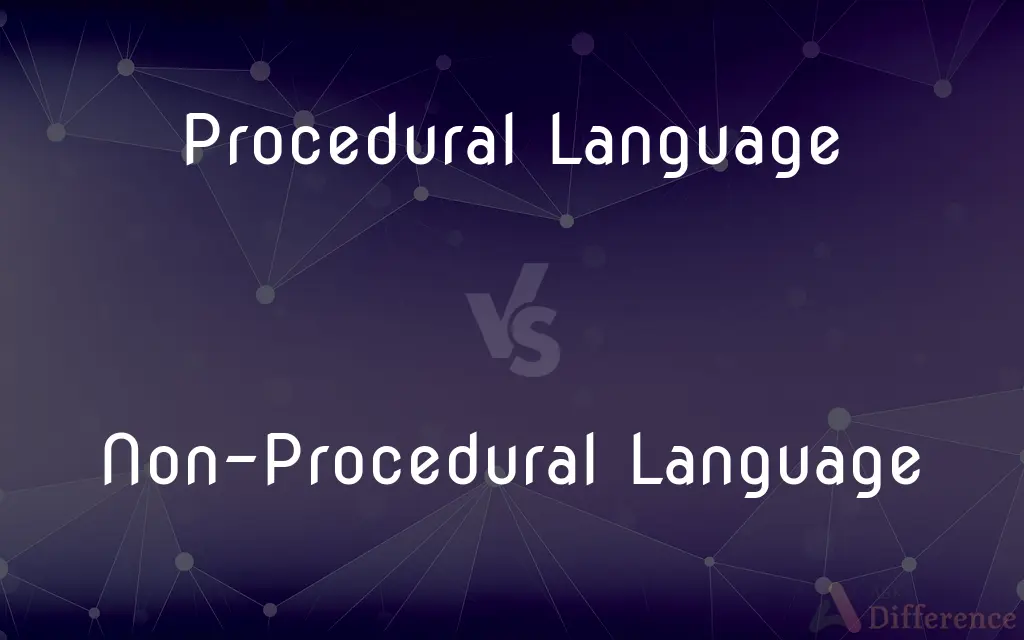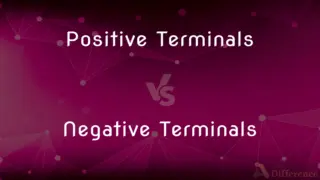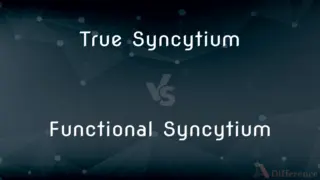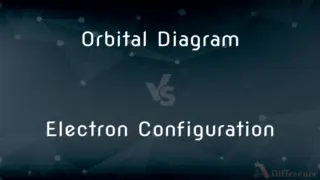Procedural Language vs. Non-Procedural Language — What's the Difference?
By Tayyaba Rehman — Published on January 8, 2024
Procedural Language focuses on the procedure of how tasks are performed. Non-Procedural Language focuses on what tasks are performed, without specifying how.

Difference Between Procedural Language and Non-Procedural Language
Table of Contents
ADVERTISEMENT
Key Differences
Procedural Language: Procedural languages are centered around procedures or routines. They involve writing a series of instructions for the computer to follow, dictating how tasks should be executed. Examples include C and Fortran. Non-Procedural Language: Non-procedural languages, in contrast, allow developers to define what tasks should be performed without specifying the exact steps. Languages like SQL and Prolog fall into this category.
Procedural Language: These languages require a more detailed approach, with explicit sequences and steps, making them more granular and control-oriented. They are often used for tasks where precision and sequence control are key. Non-Procedural Language: Non-procedural languages abstract away the step-by-step implementation, making them more suitable for high-level programming where the focus is on the end result rather than the process.
Procedural Language: Procedural programming is generally more about 'how' to achieve an objective, focusing on the algorithm. This approach provides a clear structure for programs but can become complex for large-scale applications. Non-Procedural Language: Non-procedural programming, focusing on 'what' to achieve, is often more concise and easier to write, especially for database queries and logical assertions, but might be less transparent in terms of the underlying process.
Procedural Language: In procedural languages, the emphasis on procedure and order of operations makes them inherently suitable for tasks that require detailed step-by-step control, like system programming. Non-Procedural Language: For tasks that require dealing with complex data structures or relationships, like database management, non-procedural languages are more adept due to their declarative nature.
Procedural Language: Procedural languages tend to offer more control over computer resources, which can lead to more efficient execution for certain tasks. Non-Procedural Language: Non-procedural languages, while often more efficient in terms of development time, may sometimes lead to less efficient execution, as the control over low-level details is reduced.
ADVERTISEMENT
Comparison Chart
Approach
How tasks are performed
What tasks are performed
Control
Detailed control over processes
High-level control, less detailed
Suitability
System programming, detailed tasks
Database queries, abstract problems
Complexity
Can be complex for large applications
Generally simpler and more concise
Execution Efficiency
Often more efficient execution
May have less efficient execution
Compare with Definitions
Procedural Language
Procedural languages offer granular control over tasks.
Using Pascal, a procedural language, programmers control every detail of data structures and algorithms.
Non-Procedural Language
Non-procedural language defines what tasks are done, not how.
SQL, a non-procedural language, lets you query data without specifying traversal steps.
Procedural Language
Procedural language involves step-by-step instructions for tasks.
C, a procedural language, uses functions to systematically process data.
Non-Procedural Language
Non-procedural languages offer high-level control.
Using a non-procedural language like MATLAB simplifies complex mathematical computations.
Procedural Language
It focuses on the algorithm and flow of the program.
In procedural programming with Python, you define explicit loops and conditions.
Non-Procedural Language
Non-procedural languages focus on end results.
In SQL, you define the data retrieval goal, not the process to retrieve it.
Procedural Language
Procedural languages are control and detail-oriented.
Writing a sorting algorithm in Java, a procedural language, involves defining each step of the sorting process.
Non-Procedural Language
They are suited for high-level programming tasks.
LISP, used for AI development, focuses on what the program should achieve.
Procedural Language
They require explicit sequence of operations.
Procedural programming in C++ involves detailing each operation for managing memory.
Non-Procedural Language
It abstracts the details of implementation.
Using Prolog, a non-procedural language, you state logical rules without detailing the control flow.
Common Curiosities
What is the main focus of a procedural language?
The main focus is on the procedure or the steps to achieve a task.
How do procedural languages handle data?
Procedural languages often require explicit manipulation and management of data.
What tasks are non-procedural languages best suited for?
They are best suited for tasks like database management and logical problem solving.
How do procedural languages manage complex tasks?
They manage by breaking down tasks into detailed, step-by-step instructions.
Is C++ a procedural or non-procedural language?
C++ is primarily a procedural language but also supports object-oriented programming.
Are non-procedural languages easier to learn?
They can be easier for beginners due to their focus on what rather than how.
How does abstraction in non-procedural languages benefit developers?
Abstraction simplifies coding by focusing on the end goal rather than the process.
Are non-procedural languages less efficient?
They can be less efficient in execution but are often more efficient in development time.
Can procedural languages handle high-level tasks efficiently?
While they can handle high-level tasks, they may require more detailed coding.
Can procedural languages support large-scale applications?
Yes, but they may become complex due to detailed control requirements.
Do non-procedural languages require detailed knowledge of algorithms?
They require less detailed knowledge of algorithms compared to procedural languages.
Do non-procedural languages offer better resource sharing?
They often provide better resource sharing due to their high-level abstraction.
Can non-procedural languages be used for system programming?
They are less commonly used for system programming due to less control over system resources.
Are SQL and Prolog examples of non-procedural languages?
Yes, SQL and Prolog are examples of non-procedural languages.
What is a key advantage of procedural languages?
A key advantage is their ability to provide detailed control over computer resources.
Share Your Discovery

Previous Comparison
Positive Terminals vs. Negative Terminals
Next Comparison
URL vs. Domain NameAuthor Spotlight
Written by
Tayyaba RehmanTayyaba Rehman is a distinguished writer, currently serving as a primary contributor to askdifference.com. As a researcher in semantics and etymology, Tayyaba's passion for the complexity of languages and their distinctions has found a perfect home on the platform. Tayyaba delves into the intricacies of language, distinguishing between commonly confused words and phrases, thereby providing clarity for readers worldwide.














































